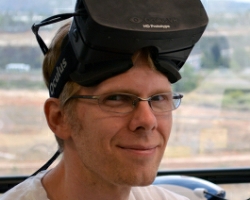The email sent will contain a link to this article, the article title, and an article excerpt (if available). For security reasons, your IP address will also be included in the sent email.

Facebook has been teasing us. While many of their recent acquisitions have been surprising, shocking is the only word adequately describing Facebook's 5 day whirlwind acquisition of Oculus, immersive virtual reality visionaries, for a now paltry sounding $2 billion.
The backlash is a pandemic, jumping across social networks with the speed only a meme powered by the directly unaffected can generate.
For more than 30 years VR has been the dream burning in the heart of every science fiction fan. Now that this future might finally be here, Facebook’s ownage makes it seem like a wonderful and hopeful timeline has been choked off, killing the Metaverse before it even had a chance to begin.
For the many who voted for an open future with their Kickstarter dollars, there’s a deep and personal sense of betrayal, despite Facebook’s promise to leave Oculus alone. The intensity of the reaction is because Oculus matters to people. It's new, it's different, it creates a better future. It's important in a way sending messages or taking pictures never can be.
Let’s use Andy Baio as a sane example of the loyal opposition:
I can palpably feel the oxygen sucked out of the room. Infinite bright possibilities from indie game devs, quietly shelved.
Jigsus backs this up on reddit:
Within the last hour EVERY friend I know was developing a rift game has canceled. That's around 11 projects just gone.
So WTF? Why in this reality would Oculus sell to Facebook? At first blush it makes little sense. A more mismatched couple could hardly be created in a fantasy immersive 3D game.
Yet there's a reason and a method here that's not only about about a sweet payoff. When you look deeper at the Facebook deal it’s about Oculus' existential need to scale. And scale is something Facebook is very, very good at.
Let’s explore why this deal makes more sense for Oculus than it might first appear and the central role scalability plays in the decision making...














 Return to Article
Return to Article